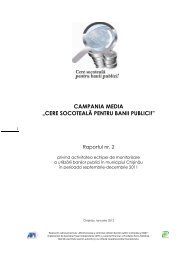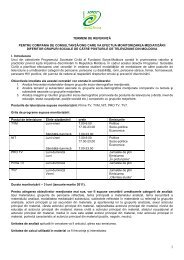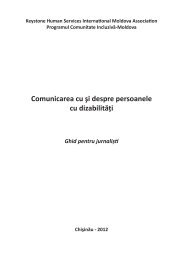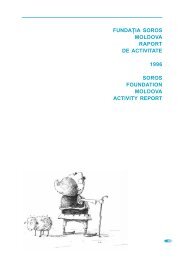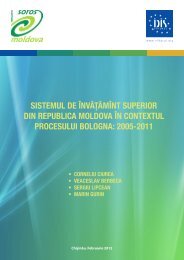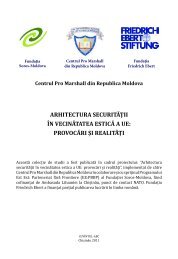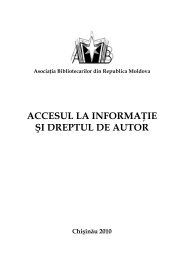Perceptions of the Population of the Republic of Moldova - Soros ...
Perceptions of the Population of the Republic of Moldova - Soros ...
Perceptions of the Population of the Republic of Moldova - Soros ...
- No tags were found...
Create successful ePaper yourself
Turn your PDF publications into a flip-book with our unique Google optimized e-Paper software.
<strong>Perceptions</strong> <strong>of</strong> <strong>the</strong> <strong>Population</strong> <strong>of</strong> <strong>the</strong> <strong>Republic</strong> <strong>of</strong> <strong>Moldova</strong> on Discrimination: Sociological Study 31Social distance between respondents and representatives <strong>of</strong> gay andlesbian community. According to <strong>the</strong> study results, <strong>the</strong> perception <strong>of</strong> population on homosexualrelations is very negative. Thus, over 80% <strong>of</strong> respondents think that <strong>the</strong>se relations are bad, 9% - that <strong>the</strong>yare nei<strong>the</strong>r bad, nor good, 9% don’t know, and only 1% stated that <strong>the</strong>se relations are good.Chart 13. <strong>Perceptions</strong> <strong>of</strong> population on homosexual relations, %91 9are goodnei<strong>the</strong>r good, nor badare badI don't know81Depending on residence, <strong>the</strong> share <strong>of</strong> people who believe that such relations are bad is higher in ruralareas (84%) than in urban areas (76%), which fact indicates that respondents from urban areas are moreloyal in respect <strong>of</strong> homosexual relations.Depending on gender, women are less categorical than men. Thus, 79% <strong>of</strong> women compared to 83%<strong>of</strong> men stated that homosexual relations are bad.Depending on age, <strong>the</strong> share <strong>of</strong> people who believe that homosexual relations are bad is lower in <strong>the</strong>age group <strong>of</strong> 18-34 years (75%) and over 65 years (74%), and is higher in <strong>the</strong> age group aged 35-49 years(86%) and 50-64 years (86%). In <strong>the</strong> case <strong>of</strong> <strong>the</strong> age group 18- 34 years, we suppose that <strong>the</strong>ir attitudes havechanged due to communication activities conducted over <strong>the</strong> last years in <strong>the</strong> field <strong>of</strong> homosexual relationsand to <strong>the</strong> promotion <strong>of</strong> principles <strong>of</strong> tolerance. As regards <strong>the</strong> age group <strong>of</strong> over 65 years, we consider that<strong>the</strong>se people are more loyal because a good share <strong>of</strong> <strong>the</strong>m does not really know what homosexual relationsmean, while for o<strong>the</strong>rs such relations are not a big problem, being a distant phenomenon for <strong>the</strong>m.Depending on education level, people with a high level <strong>of</strong> education are more loyal in respect <strong>of</strong>homosexual relations than those with a low education level. Thus, 76% <strong>of</strong> respondents holding a universitydegree and 82% <strong>of</strong> respondents with primary or incomplete secondary education stated that homosexualrelations are bad.Depending on occupation, 68% <strong>of</strong> pupils and students believe that homosexual relations are bad,while 16% - that <strong>the</strong>y are nei<strong>the</strong>r bad, nor good.The study revealed also that people for whom faith in God is very important or ra<strong>the</strong>r important areless tolerant towards gays and lesbians than people for whom faith in God is ra<strong>the</strong>r unimportant or notimportant at all. Thus, 82% <strong>of</strong> respondents for whom faith in God is very important or ra<strong>the</strong>r important and67% <strong>of</strong> respondents for whom faith in God is ra<strong>the</strong>r unimportant or not important at all think thathomosexual relations are bad.The study also revealed that, even though <strong>the</strong> respondents had <strong>the</strong> opinion that representatives <strong>of</strong> gayand lesbian community are less discriminated than persons with disabilities, <strong>the</strong> poor and HIV-positivepersons, on <strong>the</strong> level <strong>of</strong> personal attitudes this particular group is more socially isolated than <strong>the</strong> o<strong>the</strong>rs.Thus, <strong>the</strong> Chart below shows that only 14% would agree to have representatives <strong>of</strong> gay and lesbiancommunity as neighbors, 13% - as a co-workers, 10% - as friends and 4% - as family members (see Chart 14).




